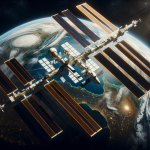A newly proposed economic model envisions a fully autonomous financial system for Mars, designed to ensure political and monetary independence from Earth. Dr. Jacob Haqq-Misra, Director and Senior Research Investigator at Blue Marble Space Institute of Science, outlines this vision in a recent study submitted to Space Policy. The model focuses on establishing a sovereign Mars, enabling settlers to build a self-sustaining society distinct from Earth’s influence.
Core Principles
Dr. Haqq-Misra’s framework, elaborated in his book Sovereign Mars, sets forth five conditions essential for Martian sovereignty. These include relinquishing Earth citizenship, securing Martian autonomy in political and financial affairs, and prohibiting Earthlings from owning land on Mars. The model also stipulates that all technological resources brought from Earth must remain on Mars permanently.
Exploring deeper economic facets, the study proposes the adoption of a “full reserve banking” system, where banks would hold 100% of their deposits in reserve. This is in stark contrast to Earth’s “fractional reserve” banking system, which allows banks to loan out more than they hold in cash, potentially leading to financial instability.
Economic Self-Sufficiency
Another critical idea is the diffusion of capital ownership to prevent the centralization of power, which could lead to corruption. Instead of centralized or government ownership, the model suggests distributing ownership of wealth-generating assets widely among Martian settlers.
Tourism on Mars would be tightly regulated under this system, ensuring that tourists neither own capital nor engage in currency transactions on Mars. Any physical goods exchanged would be the only accepted means of trade for tourists.
Comparing this proposal with earlier discussions on independent Martian settlements reveals a significant shift in focus. While previous discussions often centered on the logistics of human survival and infrastructure, Dr. Haqq-Misra’s study delves into the governance and economic sustainability aspects. This approach highlights the importance of comprehensive planning to avoid replicating Earth’s economic pitfalls on Mars.
Earlier debates on Martian colonization frequently touched on the potential for Mars to become a sovereign entity, but seldom addressed the detailed economic structures necessary for longevity. Dr. Haqq-Misra’s model presents a proactive strategy, aiming to establish economic stability from the outset.
The study underscores the necessity of a robust infrastructure and resource base to support a self-sustaining Martian economy. Dr. Haqq-Misra emphasizes the role of “deep altruism” among initial settlers and backers, who may need to prioritize long-term benefits over immediate financial returns.
He notes that anticipating governance and economic challenges before human arrival on Mars could provide valuable insights for both Martian and Earth-based systems. Formulating such strategies now could facilitate smoother transitions and adaptations when humans eventually settle on Mars.
Dr. Haqq-Misra is collaborating with students through the BMSIS Young Scientist Program to examine historical analogues for Mars sovereignty. The findings from these studies could further refine the proposed economic model, helping to ensure its feasibility and success.
Establishing a sovereign and economically independent Mars is a complex but potentially transformative endeavor. By addressing key economic principles and governance structures early, the transition to a self-sustaining Martian society could be more seamless, providing a unique opportunity to learn from Earth’s economic challenges and build a better financial system from scratch.










